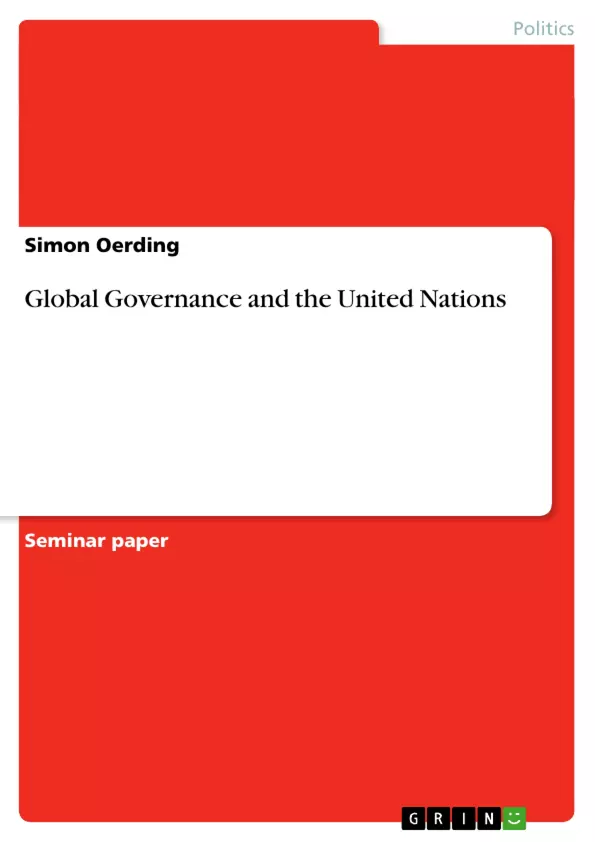[...] Clearly, the paper revolves around the normative concept of global governance. While
in scientific literature, the normative concept of global governance has become
unfashionable by the time and a rather critical analysis of the implication of
international regulation has taken precedence, it will be outlined that there is good
reason to investigate the connection between the UN and the normative concept. By no
means does this foreclose the importance of critical scrutiny of the establishing
governance architecture. The criticism of global governance as the perpetuation of
neoliberal hegemony and Western domination is acknowledged but will not be dealt
with from this point on. Surprisingly little effort been made so far to systematically link the concept of global
governance, be it normative or analytical, to the United Nations system although on a
gut level, scholars seem to agree that both are somehow linked. At the start of the
analysis, this paper sets out to present a first useful framework put forth by Brühl and
Rosert (Brühl/Rosert 2007) and adds a missing category to the analysis, the link
between the UN and the normative concept of global governance. In the normative
tradition, the developed framework inter alia proposes to consider the UN as a potential
activator for global governance as a normative concept. While the connection of global
governance and the UN as its activator offers room for gripping research, the ambition
of this paper is much downgraded. It only seeks to offer a starting point by investigating
whether the UN can actually advance global governance and tries to enable a first
cautious approach to the more general hypothesis above. To facilitate this analysis, in a first step a major problem of global governance is
selected. The fundamental lack of integration of non-state actors into governance
structures serves as a case in point for that matter. The legitimacy of global governance
suffers from this lack which in turn impedes reaping the desired benefits of the concept.
In a second step, the UN’s capacity to solve the depicted problem is analysed. [...]
Inhaltsverzeichnis (Table of Contents)
- 1. Introduction
- 2. Normative and analytical concepts of global governance
- 2.1 The United Nations and global governance
- 3. A framework of analysis
- 3.1 Operationalisation of the research question
- 4. The relevance of non-state actors in global governance
- 4.1 The problems of non-state actors in global governance
- 5. Can the UN help to solve the problem of input-legitimacy?
Zielsetzung und Themenschwerpunkte (Objectives and Key Themes)
This paper investigates the ability of the United Nations (UN) to advance the normative concept of global governance. It examines whether the UN can effectively address challenges hindering the desired outcomes of global governance, focusing specifically on the integration of non-state actors. The analysis utilizes existing frameworks, adding a crucial dimension: the UN's role as a potential activator of the normative concept of global governance.
- The normative concept of global governance and its objectives.
- The role of the UN in global governance.
- The challenges of integrating non-state actors into global governance.
- Assessment of the UN's capacity to address the integration of non-state actors.
- The UN's potential as a forum for addressing global governance challenges.
Zusammenfassung der Kapitel (Chapter Summaries)
Chapter 1: Introduction introduces the research question: Can the UN advance global governance? It highlights the growing need for global governance in an increasingly interconnected world and frames the discussion within the context of the normative concept of global governance, acknowledging existing criticisms of the concept.
Chapter 2: Normative and analytical concepts of global governance defines global governance as both a normative concept (a vision for a more just international order) and an analytical tool for describing existing international governance mechanisms. It contrasts these approaches and introduces the concept's objectives, such as social and economic justice, sustainable development and peaceful conflict resolution.
Schlüsselwörter (Keywords)
Global governance, United Nations, non-state actors, normative concept, input legitimacy, international relations, global challenges, reform proposals, UN conferences.
Frequently Asked Questions
What is the central research question of this paper?
The paper investigates whether the United Nations (UN) can advance the normative concept of global governance and solve its fundamental problems.
What is the difference between normative and analytical global governance?
The normative concept is a vision for a more just international order, while the analytical tool describes existing international governance mechanisms.
What is the main problem of global governance identified in the text?
A major challenge is the fundamental lack of integration of non-state actors into governance structures, which negatively affects legitimacy.
How does the UN relate to the concept of global governance?
The paper proposes to consider the UN as a potential "activator" for global governance as a normative concept.
What are the objectives of the normative tradition of global governance?
Key objectives include social and economic justice, sustainable development, and peaceful conflict resolution.
Does the paper address criticisms of global governance?
Yes, it acknowledges criticisms regarding neoliberal hegemony and Western domination, though it focuses on the UN's capacity for reform.
- Quote paper
- BA Simon Oerding (Author), 2008, Global Governance and the United Nations, Munich, GRIN Verlag, https://www.grin.com/document/124904



